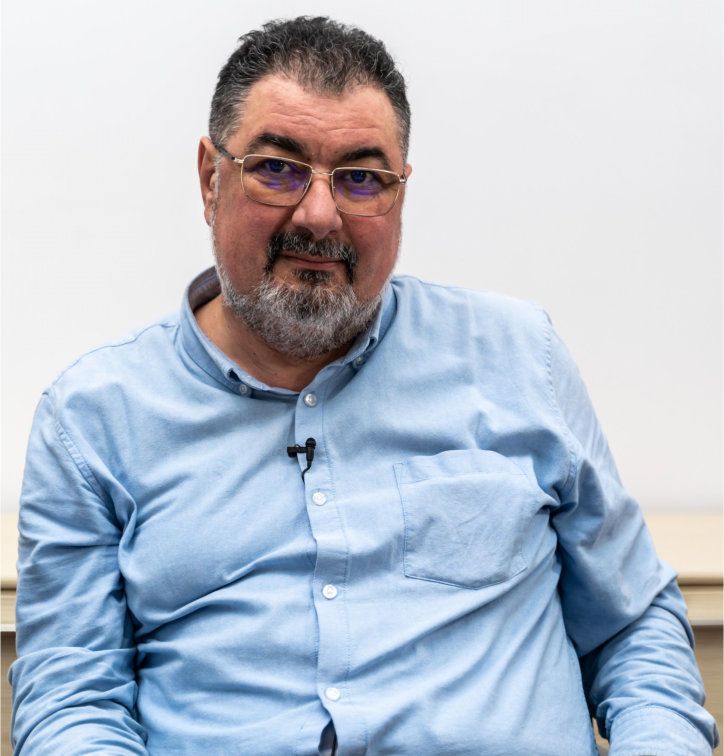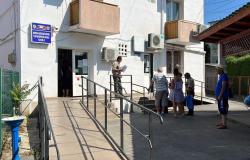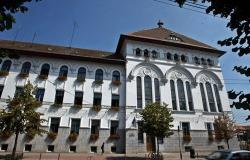They talked to us about how you can instill in a child the love of literature or how to embellish the math class to reach the students’ hearts, but also about the passion for reading and what it’s like to qualify for two school Olympics in the same year, in part II of the podcast “Spot-on at “Free Life” – Galațiul under the spotlight”, professor Romeo Zamfir, director of the “Vasile Alecsandri” National College (CNVA), Romanian language teacher Cătălina Popa and Flavia Irina Enciu, student in twelfth grade at the prestigious high school in Galăți, which in recent years has won important prizes at the national stages of the Olympiads.
– Flavia, please introduce yourself and tell us about the prizes you won.
Flavia Enciu: I’m Enciu Flavia, twelfth grade at CNVA, double medalist this year too, to use an expression from the world of sports. This year, I qualified for the Romanian Language and Literature Olympiad (OLLR) and took 3rd place in the “Reading as a Life Skill” Olympiad (OLA), which is a bit more focused on creativity and is a combination with other disciplines , such as fine arts. I took 3rd place, but a few weeks later the teacher called me and told me that there was an increase in places and I also qualified for the OLA.
Catalina Popa: At the Romanian Olympiad he took first place. He qualified at both, but at OLLR he qualified first. And it’s not the first year with dual qualification. I think that in the X, in the same way, he had a double qualification.
– How many hours a day do you work on the Romanian language? How do you study for the Olympics?
Flavia Enciu: It’s a bit more complicated for me, because I’m in high school with a real profile, in natural sciences, and I practice Romanian and reading, writing… I fill all my free time. It’s a form of escape from biology, mathematics and so on. At one time, I used to time how many hours I work per day, but now, as long as I can. During this time when I have time off for the Olympics, I try the same way, seven-eight hours a day, like this, to read, write, make notes from literary theory. Where I feel I have gaps.
– What do you read the most? What do you like?
Flavia Enciu: This year, because I started doing philosophy, I also discovered this side of literature. I started reading more fiction. But I would say that in the 10th and 11th grade, the largest proportion, fiction and novels. I also discovered poetry more this year. In the philosophy olympiad, I took 3rd place. It’s strange that by reading fiction I seem to learn more about life than by living it. I like to play with perspectives. I mean, one month I’m reading about a village in Armenia, another month I’m reading about life under communism. But it doesn’t feel like work to me. I read and that’s where I get the boost to learn literary theory or about functional styles, literary motifs, themes, etc.
– What do you want to do next, after the baccalaureate?
Flavia Enciu: Unfortunately, life at the CNVA ends in the twelfth grade, but maybe the director can extend it, do a college, a higher education. In Cluj, the Faculty of Letters and the Faculty of Foreign Languages are in the same body. In Bucharest, they are separate. Theoretically, I go to foreign languages, to human. To be honest, I have an ancestor, that is, my sister was also at Natural Sciences, she also had a teacher, Mrs. Cătălina Popa. And I knew I wanted to go to Science because I knew the teachers, I had heard stories about the teacher. It wasn’t until the 9th grade that I developed this passion for literature and for Romanian, I was undecided, I decided to take a middle path. I mean, the sciences, I say, are quite balanced.
– And the stories you heard about the lady came true in high school?
Flavia Enciu: Yes, indeed. I mean… I think we’re doing reading clubs with the lady. I had all kinds of workshops where I went to the Museum of Visual Arts. We were given fragments of poems that we had to reconstruct and then find a painting that reminded us of the poem we had chosen. And many, many activities like this, which, yes, developed my creativity.
– If you were in the 4th grade now, what would make you go to CNVA?
Flavia Enciu: The fact that someone, compared to the other secondary schools in Galati, really opens certain doors for you. I know you can go. All the competitions I talked about, such as “Amarine”, “Calude”, “English for Exams”, the teachers who teach at the high school are also at the gymnasium, there is a certain continuity. You are given a small direction, even if, let’s say, you have more work. I think it’s doable to balance childhood with homework. To develop in another environment, a beautiful environment, an environment full of culture, is everyone’s dream, right?
“We must make reading a celebration”
– Teacher, what do we tell the little ones, who are now in the 4th grade, and want to come to the CNVA?
Catalina Popa: I would add to this equation work, talent, performance, a little play and a little joy. When we work for the Olympics, we get together, we help each other, we just feel good with each other, we enjoy ourselves, which I think is extraordinary. There is also a competition in the Romanian language, but it is a little different. For example, last year, Flavia was a little disappointed at the national olympiad and called me, she was almost crying, but she said: “You know, Lăcrămioara won first place and I’m so happy that Lăcrămioara won and Matthew mentions”. I think it is important to develop this team spirit as well.
But let’s go back to the little ones. It’s good for them to work, but it’s good for them to play too, don’t forget that they’re small, and I’d like their parents to not forget that they’re small, and teachers not to forget that either. We learn a lot through play.
– How do we get them to read?
Catalina Popa: I don’t know if you will like my answer, but we as parents should not force our children to read, we should give them an example. The first step is to read ourselves, to have books in the house, because when a child grows up surrounded by books, he no longer sees reading as a mandatory act, imposed from somewhere. It is a natural part of life. We have to start early. If they are parents with young children, the younger the better, even if they can’t read. We read them every night. There is, I always tell the kids, a “muscle” to reading, and just as we develop muscles when we go to the gym, we must also develop the “muscle” of reading by doing it all the time. And for parents, never, ever, punish your children by forcing them to read. I mean, you’ve been on the phone too long, that’s it, you’re not allowed anymore, you go and read for two hours. That’s it, you’ve killed any joy of reading in that child. I was punishing my child by taking away his book. If you did that, you can’t read tonight. And my friends laughed at me, how to punish the child by taking away his book? Yes, but look it works. I mean, we have to make reading a celebration, a joy. And it is possible, you know. Because otherwise it is very difficult. I have students entering the 9th grade and it’s very difficult to get them to read, if they don’t have this exercise, if they haven’t caught the bug a little bit. It can, sure. You take another reading test, you give another small grade. But it’s not the right motivation to read.
– The same question for you, Professor Romeo Zamfir. How do we make them love math from a young age?
Romeo Zamfir: We try to make it attractive. Because at CNVA, math is indeed a performance, but at most schools it is Cinderella, so to speak. I had a habit in my youth. I lost it. I knew a lot of history and, always when I was teaching, I found, at least every 2-3 hours, to tell them something from history. And this really catches on with children. I’m sorry I don’t have that habit anymore now. But for those who are teachers now, I recommend them. Maybe I will come back with stories like these. But then, that’s how I attracted them. We also had situations when they did not want to do school duty, because they wanted to come to class, not to miss math class.
“Our responsibility is to help the children”
– In addition to all the nice things you talked about, we cannot overlook the unpleasant situations that happened between the students in the last weeks. How do you handle problems like this?
Romeo Zamfir: These pseudo-scandals take place in all schools, they happen frequently in society, but unfortunately they were heard more or were perceived more here. I think that the strong impact they had was the fact that the protagonists were from the CNVA, a cultural institution that for us is somewhere high. First, we need to work with parents.

And in the present case, we called the parents to the school, we talked with them and at the same time we made meetings with the psychological specialists, who talked with the students and the teachers, so that we know how to manage these situations. They are unpleasant situations, but they are part of life. Sometimes something like this happens, and the only thing we have to do is to manage to support both the children and the parents, because everyone makes mistakes. Now there are mistakes and very big ones, but in the end they are still children. And they are still ours and they come back like a family, right? We must receive them. And our responsibility is to help those in need. But, on the other hand, we must not forget that we have 1,000 students, 998 to be exact. Almost 1,000 children who are very different, come from very different backgrounds, and for things to go well for them, teachers and parents have to work together. I emphasize this. Teachers and parents must collaborate, because in the end our goal is common. Let’s help these children measure their quality and become the best children, the best adults they could become.
I want you to know that getting a prize at the Olympics now, since the new education law exists, is also a financial motivation. All these students will get a merit scholarship, regardless of their educational situation. So, just because he won a prize at the Olympics, he gets a merit scholarship. If you win a prize at the International Olympiad, you have an Olympic Excellence Scholarship 1, which is between 750 and 3,000 lei. If you win a prize at the national stage, you have the Olympic excellence scholarship 2, which is 700 lei, and the merit scholarship is awarded for the prizes at the county stage and is in the amount of 450 lei. This is why our students work and are trained from a young age to go to the Olympics and school competitions.
NOTE: The show “SPOT ON at Viața liberă – Galațiul under the spotlight” is a “Free Life” product. The full recording of this interview can be watched on the newspaper’s YouTube channel.
Tags: Successful students successful future adults
-







